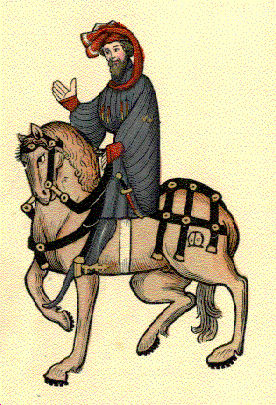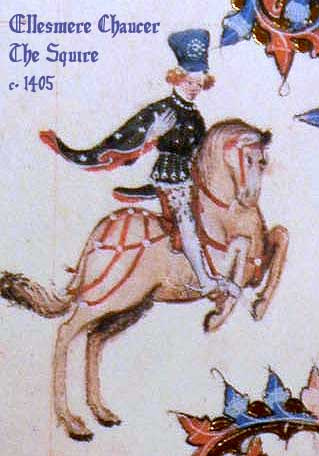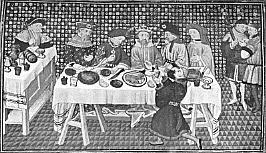Lecture Notes on The Canterbury Tales
It's still the high middle ages:
Comparisons to Dante:
- Everyone goes on a religious journey
- A sense of comprehensiveness
- People as types
- Hierarchal view of the world
- Attacks on the clergy
But something is different:
- The genre is Estates Satire, but the characters are mixed; they are not only types.
- There's a sense of humor, and different voices. The voice of Geoffrey is tentative, and what the poet thinks has to be inferred. -- Compare to Beowulf and Dante.
It was a very popular book.
Chaucer's attitude & humor: springtime & pilgrimage
The Knight

- "he loved chivalrye, / Trouthe and honour, fredom and curteisye" (45-46, p. 16)
- "At mortal batailles hadde he been fiftene" (62, p. 16)
- "Ageyn another hethen in Turkye" (66, p. 16)
- "He never yet no vileinye ne sayde / In al his lyfe, unto no maner wight" (70-71, p. 18)
- "Of fustian he wered a gipoun / Al bismotered with his habergeoun" (75-76, p. 18)
The Squire

- He is a lover and a fighter.
"And he had been sometime in chivachye,
In Flaundres, in Artoys, and Picardye,
And born him wel, as of so litel space,
In hope to stonden in his lady grace." (lines 85-88, p. 18)
- He's physically attractive.
- He honors his father & probably will grow up to be like him.
The Yeoman
He takes care of equipment and is defined by equipment.
The Prioress.
- Her probable background, aristocratic and romantic qualities.
- The nature of her conscience
The Monk

The Friar
Link to Ellesmere image.
Link to page on monastic orders
- "A limitour, a ful solempne man" (line 209, p. 24)
- The "post" joke
- His defensiveness (line 244, p. 26)
- "Curteys he was, and lowly of servyse" (line 250, top of p. 28) [The Knight (line 46, p. 17), the Squire (line 99, p. 18), and the Prioress (lines 139-140, pp. 20-22) are also courteous.]
- His name
The Merchant
Donald Trump type
The Clerk
- Books v. horse
- "no benefyce" (line 293, p. 30)
The Sergeant of the Law
Many things in common with a modern lawyer
The Franklin

- What his designation means
- "Epicurus owne sone" (line 338, p. 32)
- "His table dormant in his halle alway / Stood redy covered al the longe day." (lines 355-356, p. 32)




